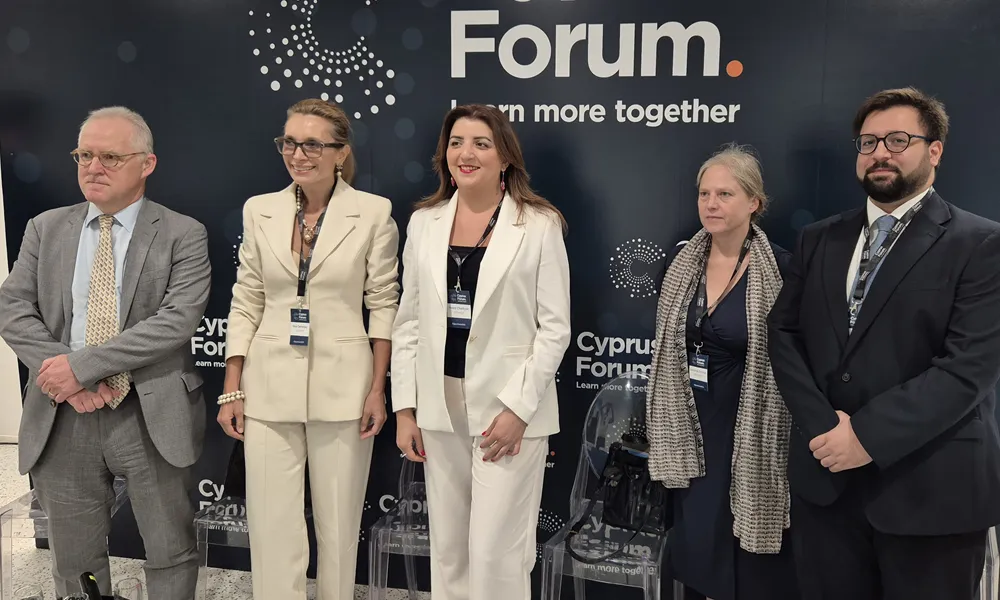Energy, security and technology are the three main areas of competition for global powers at present, and the Euro-Mediterranean region is at the intersection of all three. This was the takeaway from a Cyprus Forum discussion on the shifting balances in the region, held on Friday in Nicosia.
Analysts noted the many challenges and opportunities at play for the countries of the region. Ilkay Demirdag, co-founder of Energy Shift Capital, said the issues facing the Euro-Mediterranean were no longer regional. Everything is interconnected now and the region is part of the global power play over energy, security and technology, she argued.
Energy transition and renewables
“Electrons matter more than molecules now and this will be the case moving forward,” said Demirdag.
The energy transition, and the interconnectedness of electricity grids, is expected to draw trillions of dollars in investment. China is leading the way in renewable energy and advanced technologies. It also has access to the most critical minerals needed for the energy transition, noted Demirdag.
Europe, on the other hand, doesn’t have access to critical materials, lacks in advanced technologies, such as battery storage, and struggles to catch up on investments. This in turn creates energy security problems for Europe, said the investment manager.
British High Commissioner to Cyprus Michael Tatham echoed the view that the Eastern Mediterranean is a very important strategic region in terms of energy and transport routes. However, in recent years, it has been marked by “very significant instability and turbulence”.
The UK’s core interest in the region is stability, which would facilitate economic activity, trade, energy infrastructure and more, he said.
Cyprus an ‘important’ partner
The current priorities for achieving stability at present are Gaza and Syria, said the British diplomat, noting that for Gaza, the immediate next steps should be a ceasefire, the release of hostages and flow of humanitarian aid into the Strip. Longer stability requires a political pathway towards a two-state solution, added Tatham.
On Cyprus, the High Commissioner said the UK sees Cyprus as a “really important” regional partner. “We welcome the fact that Cyprus is well plugged into the region and has good relations with Israel and its Arab neighbours.”
Dorothée Schmid, Director of the Turkey-Middle East programme at the French Institute of International Relations (IFRI), highlighted an important shift in terms of the return of diplomacy in the Middle East. The war in Gaza has brought together countries that previously avoided dialogue, as seen by the Iran-Saudi Arabia detente, but also the solidarity shown by Gulf states to Qatar after Israel struck its capital Doha with the aim of wiping out Hamas negotiators.
“A few years ago, these countries were close to confrontation. Now, there seems to be a common diplomatic effort to work on security architecture, which is currently very much dominated by Israel,” said Schmid.
Turkey wants to consolidate footprint in the region
Regarding Turkey’s strategic and economic priorities in the region, the IFRI analyst said Turkey’s aim was to consolidate its footprint after investing a lot in the Middle East, and in the Mediterranean as a maritime space.
Schmid highlighted the shift since the 2016 coup attempt in Turkey, in terms of Tayyip Erdogan’s consolidation of control over the military. “They are working together now. It’s very important to understand,” she said.
The Turkish government works hand in hand with the military and private sector to go beyond its borders, exercising both soft and hard power in the region, extending as far as Libya.
“Turkey’s driving proirity is to become a structural power in the region… Its ultimate objective is to keep the autonomy they’ve been working on for two decades, and to defend Turkish interests. They don’t want to compromise with NATO or the EU on defining their national interests,” said Schmid.
Turkey’s perceived threats – Israel, Black Sea and Aegean
The analyst argued that Turkey views current geopolitical shifts as a threat, noting that the country inherited a strong psychology of threat perception from its history, particularly the collapse of the Ottoman Empire. Turkey views itself and its borders as being constantly under threat, encouraging its revisionist tendencies with neighbours.
The two perceived threats for Turkey are the Aegean and the Black Sea, though the latter holds the biggest risk of confrontation between Russia and NATO. Turkey will have to choose a side, and it is not obvious that Turkey’s interests lie more with NATO than Russia, argued Schmid.
Danger of remilitarising the Cyprus issue
Israel is a new developing threat that is building in Turkey’s psychology, said the IFRI analyst. “This is where Cyprus has a role to play. Now, the division could be contemplated in terms of a broader confrontation of forces, and the need to strike a balance with Israel,” she added.
Schmid warned of the dangerous trend of remilitarising the issue of Cyprus, whose strategic position is changing the regional context. Not only does it change the role of external players in the island’s division, it also raises questions as to the level of control the Cypriots may be able to maintain over their island as its strategic value is magnified.
Energy collaboration with neighbours
On a final point, the analyst noted Cyprus also had the chance to play a significant role in the energy needs of the region. She described the talk on energy corridors as “outdated”. Instead, Cyprus should look around its neighbourhood at where the need for energy is really at, particularly in terms of reconstruction in Syria, Lebanon and possibly Gaza.
On the other hand, Demirdag noted that Cyprus also had an opportunity to join forces with other countries on energy collaboration. Hydrogen and LNG projects, required to achieve net zero emission targets, are mega projects that require huge capital flows, long-term stability and multilateral agreements with other countries. Turkey wants to be at the centre of the energy transition in the region, Demirdag pointed out.
